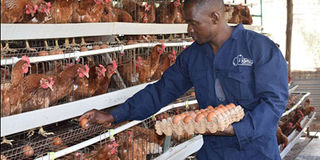DIARY OF A POULTRY FARMER: Poultry products buyers look for

Steve Kamwa, the director of Kamsa Poultry Farm attending to his poultry at Nyahera, Kisumu County. PHOTO |ELIZABETH OJINA| NMG
What you need to know:
- Sam runs an upmarket butchery in Westlands in Nairobi and has a diverse clientele comprising of locals and foreigners with exquisite tastes.
- It’s important to distinguish between ‘cage-free’, ‘free-range’, and ‘organic’ poultry products, especially if you’re targeting the upmarket.
- The most-effective measure of preventing cannibalism gives the birds access to pasture and locomotion
I got an unexpected call from Sam last week Monday, which took me back to the reason I started rearing chicken and why when you’re developing a marketing plan, the experience gained overtime is just as important as what one would read from books.
For a long time, I’ve been looking to sell my products to the high-end market, including supermarkets and for this reason, I’d invested in registering a company, logo and Kenya Bureau of Standards mark of quality which unfortunately I’d never used.
“Do you supply eggs?” Sam asked me.
At the back of my mind, I figured he was looking for fertile eggs for hatching chicks, which is my new sale strategy because I sell a crate for Sh600 which enables me to recoup cost of feeds and labour.
Upmarket butchery
Sam runs an upmarket butchery in Westlands in Nairobi and has a diverse clientele comprising of locals and foreigners with exquisite tastes.
When I told him I could supply him about 10 crates every week, he added, “Are they free-ranged eggs?” In my mind, I assumed he meant eggs raised from chickens that run wild all over to forage for themselves — what most people refer to as the ‘original Kienyeji’ chickens or ‘road-runners’ — Seeds of Gold, March 24. (Free range may apply to eggs, meat or dairy products).
I was relieved when he explained that he was looking for eggs from chickens raised either in open barns but which have access to sunlight, fresh air and are able to move around freely (as opposed to in battery cages), or those that “roam freely outdoors at least part of the day, rather than being confined in an enclosure for 24 hours each day”.
If you recall, when I started rearing chickens, I had an eye on the market and I knew that some customers care a lot about the welfare and source of their poultry products. I opted to engage in organic poultry farming and that’s why I rear only Kienyeji chickens (see How I picked the chicken breed to rear available online).
Organic poultry production
The challenge was that when I moved my enterprise from Busia to Nairobi, I couldn’t meet all the standards for organic poultry production like outside access, welfare and feeding, but at least I tried my best.
You see, it’s important to distinguish between ‘cage-free’, ‘free-range’, and ‘organic’ poultry products, especially if you’re targeting the upmarket.
‘Cage-free’ means that while the hens are not squeezed into small battery cages, they never go outside. Similar to battery-caged, ‘cage-free’ hens are typically confined in “dark, crowded buildings filled with toxic gases and disease microbes,” he explained. To prevent the spread of infections in the flock, antibiotics are administered throughout.
Another difference between ‘free-range’ and ‘cage-free’ is de-beaking. The most-effective measure of preventing cannibalism gives the birds access to pasture and locomotion. Some people think that de-beaking can be seen as a litmus test for whether the chickens' environment is sufficiently "free-range”.
In fact, cage-free chickens are often de-beaked like the battery-caged at the hatchery.
According to experts, chickens are designed to dig in the ground for food with their beaks and claws as part of pecking order and when idle, they peck at each other resulting in injuries
Chickens also love sunlight and bathing in the sun and dirt, something “cage-free” and “battery-caged” hens are denied.
Egg branding
I also learnt from Sam that branding eggs “yellow-yolked eggs” or “Kienyeji” doesn’t sell to his clientele.
Packaging was another thing. I packed the eggs in crates of six each with a label containing my company’s name and logo.
Unfortunately, there’s no standard definition for ‘free-range’ in Kenya and the Kebs doesn’t offer free-range certification. As such, if you’re targeting this market, trust and honesty counts.
Another thing I can’t wait to tell is how my eggs fare.





